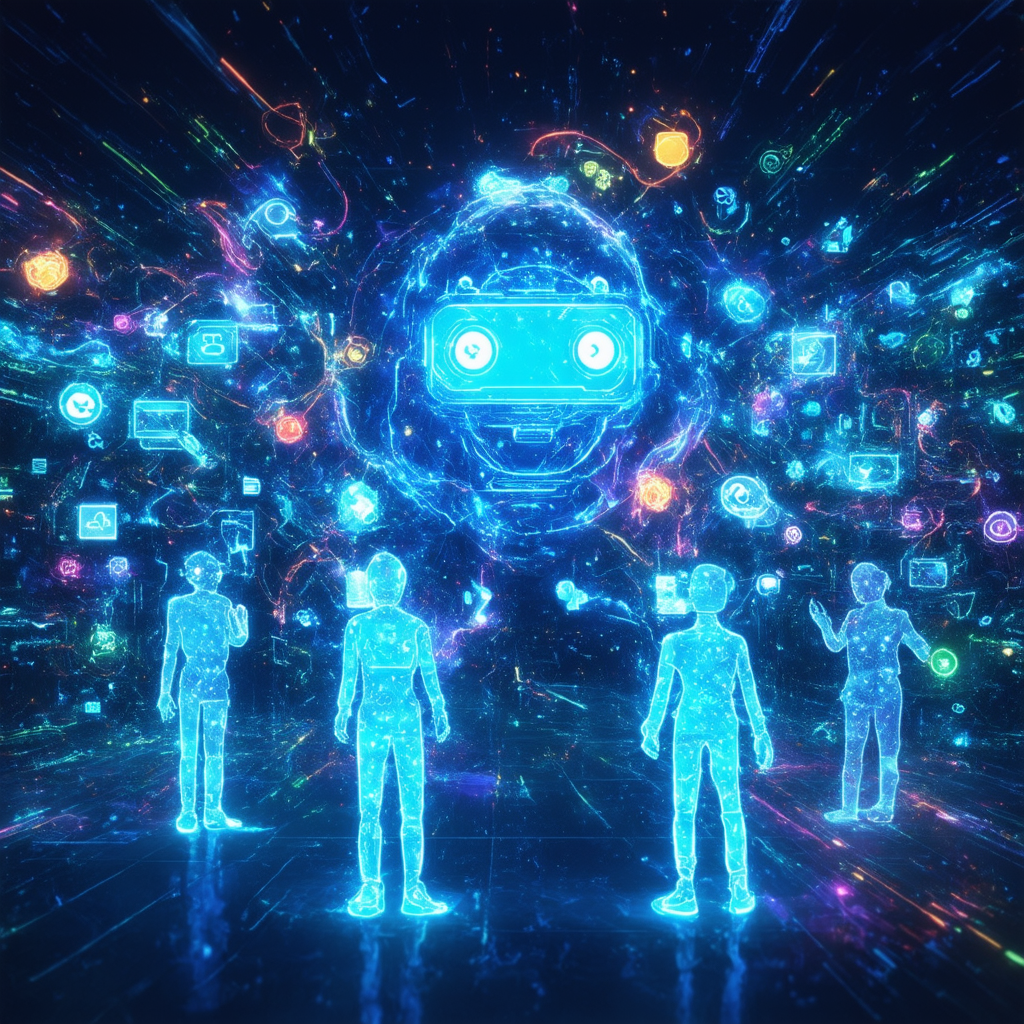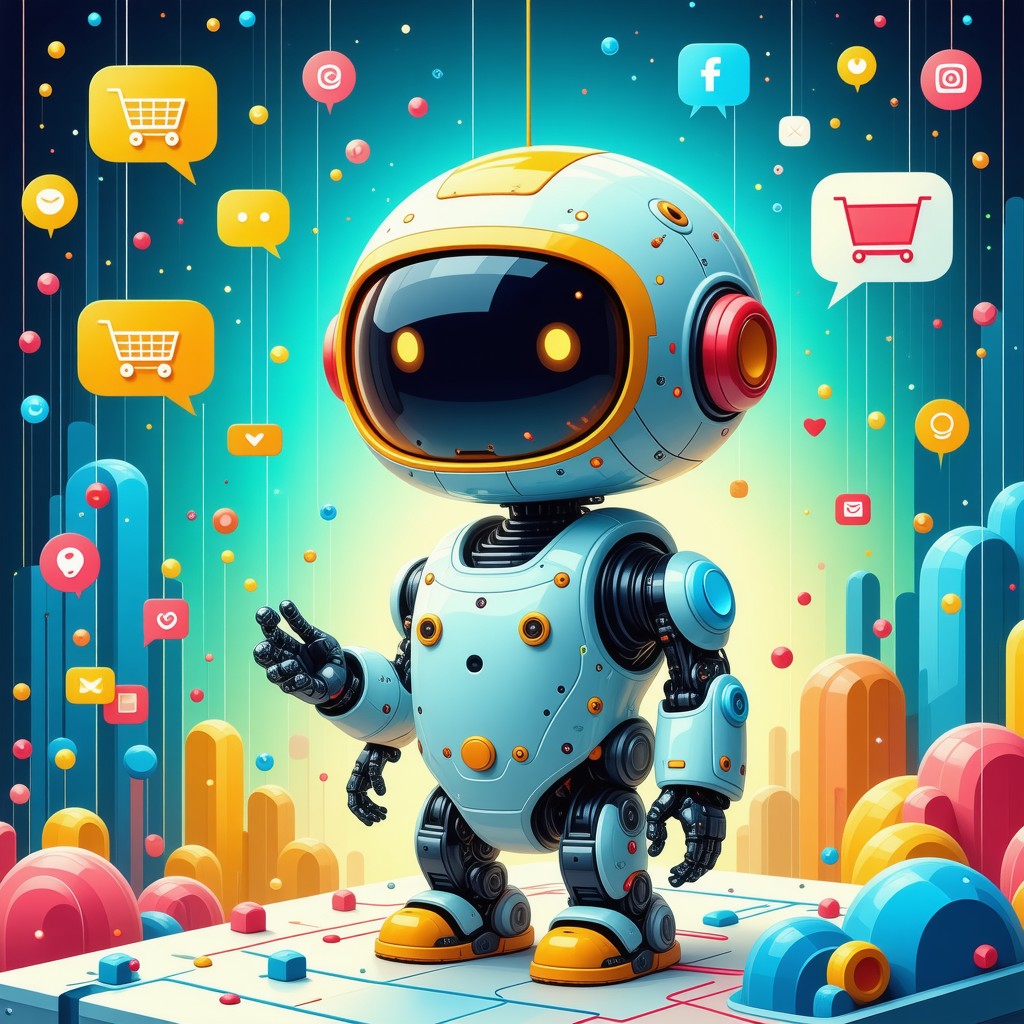In today’s fast-paced digital landscape, understanding the benefits of chatbots for customers has become essential for businesses aiming to enhance service and foster loyalty. This article, titled Unlocking the Benefits of Chatbots for Customers: How AI Enhances Service and Loyalty, delves into the transformative role of chatbots in customer interactions. We will explore how these AI-driven tools not only streamline communication but also provide significant advantages across various industries, including healthcare and education. By examining key benefits such as improved user experience and increased customer satisfaction, we aim to uncover why customers increasingly prefer chatbots over traditional service methods. Additionally, we will discuss the primary purpose of using chatbots in customer service and analyze their impact on customer loyalty. Join us as we navigate through the myriad benefits of chatbots and discover how they can revolutionize the way businesses engage with their clientele.
Benefits of Chatbots for Customers: How AI Enhances Service and Loyalty
How do chatbots help customers?
Understanding Chatbots: What Are Chatbots?
Chatbots are advanced software applications designed to simulate human conversation through artificial intelligence (AI). They can interact with users via text or voice, providing instant responses to inquiries and facilitating seamless communication. By leveraging natural language processing (NLP), chatbots can understand and respond to customer queries effectively, making them an invaluable tool for businesses aiming to enhance customer service. The AI chat assistant technology exemplifies how chatbots can be utilized across various platforms, including websites and social media, to improve user engagement and satisfaction.
The Role of AI in Chatbots: Benefits of AI Chatbots
AI chatbots offer numerous benefits that significantly enhance customer interactions:
- Enhanced Customer Engagement: Chatbots facilitate real-time communication, allowing businesses to engage customers proactively. They can send timely updates regarding order statuses, tracking numbers, and payment issues, ensuring customers feel informed and valued.
- 24/7 Availability: Unlike traditional customer service, chatbots operate around the clock, providing instant responses to customer inquiries at any time. This constant availability enhances customer satisfaction and reduces wait times.
- Personalized Experiences: Advanced chatbots utilize AI and machine learning to analyze customer data and preferences. This enables them to deliver personalized recommendations and tailored responses, improving the overall customer experience.
- Efficient Problem Resolution: Chatbots can quickly address common customer issues, such as FAQs, troubleshooting, and account inquiries. By automating these processes, they free up human agents to focus on more complex problems, enhancing operational efficiency.
- Cost Reduction: Implementing chatbots can significantly lower operational costs for businesses. By automating routine tasks, companies can reduce the need for extensive customer service teams, leading to substantial savings.
- Data Collection and Analysis: Chatbots can gather valuable customer feedback and insights during interactions. This data can be analyzed to improve products, services, and customer engagement strategies, driving business growth.
- Lead Generation and Qualification: Chatbots can engage website visitors, qualify leads through targeted questions, and guide potential customers through the sales funnel, increasing conversion rates.
- Multilingual Support: Many chatbots are equipped to handle multiple languages, allowing businesses to cater to a diverse customer base and enhance global reach.
- Integration with Other Systems: Chatbots can seamlessly integrate with CRM systems, e-commerce platforms, and other business tools, streamlining operations and providing a cohesive customer experience.
- Scalability: As businesses grow, chatbots can easily scale to handle increased customer interactions without the need for significant additional resources.
By harnessing the benefits of AI chatbots, businesses can not only improve customer satisfaction but also drive efficiency and growth in their operations.

Benefits of Chatbots for Customers
Chatbots have revolutionized customer service by providing numerous benefits that enhance user experience and foster loyalty. Understanding the benefits of chatbots for customers is essential for businesses looking to improve their service offerings. These AI-driven tools not only streamline communication but also create a more engaging and efficient interaction for users.
How do chatbots help customers?
Chatbots serve as a vital component in modern customer service strategies, offering a range of advantages that cater to customer needs. Here are some of the key benefits of using chatbots:
- 24/7 Availability: Chatbots provide round-the-clock service, ensuring customers can receive assistance at any time, which enhances user experience and satisfaction.
- Instant Response Times: With the ability to handle multiple inquiries simultaneously, chatbots significantly reduce wait times, leading to quicker resolutions for customer queries.
- Cost Efficiency: Implementing chatbots can lower operational costs by reducing the need for extensive customer service teams, allowing businesses to allocate resources more effectively.
- Personalized Customer Interactions: Advanced AI algorithms enable chatbots to analyze user data and interactions, allowing for tailored recommendations and responses that meet individual customer needs.
- Scalability: Chatbots can easily scale to handle increased customer interactions during peak times without compromising service quality, making them ideal for growing businesses.
- Data Collection and Insights: Chatbots can gather valuable data from customer interactions, providing businesses with insights into customer preferences and behaviors, which can inform marketing strategies.
- Enhanced Customer Engagement: By proactively reaching out to customers with relevant information and offers, chatbots can boost engagement and encourage repeat business.
- Multilingual Support: Many chatbots are equipped to communicate in multiple languages, making it easier for businesses to serve a diverse customer base.
- Integration with Other Systems: Chatbots can seamlessly integrate with CRM systems and other business tools, streamlining operations and improving overall efficiency.
- Improved Customer Satisfaction: By providing quick, accurate, and personalized responses, chatbots can significantly enhance overall customer satisfaction, leading to increased loyalty and retention.
The Role of AI in Chatbots: Benefits of AI Chatbots
The integration of artificial intelligence in chatbots amplifies their effectiveness, making them indispensable in various industries. The benefits of AI chatbots include:
- Advanced Natural Language Processing: AI chatbots utilize sophisticated algorithms to understand and respond to customer inquiries in a conversational manner, enhancing user experience.
- Continuous Learning: AI chatbots improve over time by learning from interactions, which allows them to provide more accurate and relevant responses.
- Proactive Customer Support: AI chatbots can anticipate customer needs based on previous interactions, offering assistance before customers even ask for help.
- Integration with Business Intelligence Tools: AI chatbots can analyze data from various sources, providing businesses with actionable insights to improve service delivery.
In sectors such as healthcare, the benefits of chatbots extend to improving patient engagement and streamlining administrative tasks. For example, AI healthcare chatbots can assist patients with scheduling appointments and answering common health-related questions, thereby enhancing overall service efficiency.
As we explore the benefits of chatbots for customers, it becomes clear that their implementation not only enhances customer satisfaction but also drives business growth through improved operational efficiency and engagement.
Benefits of Chatbots for Customers: How AI Enhances Service and Loyalty
How do chatbots help customers?
Chatbots have revolutionized customer service by providing numerous benefits that enhance user experience and satisfaction. Understanding chatbots and their functionalities is crucial for recognizing their impact on customer interactions. These AI-driven tools are designed to streamline communication, offering a range of advantages that cater to customer needs.
Understanding Chatbots: What Are Chatbots?
Chatbots are automated programs that utilize artificial intelligence to simulate human conversation. They can interact with users through text or voice, providing instant responses to inquiries. The core functionalities of chatbots include automated responses, workflow automation, and lead generation, making them essential tools for businesses aiming to enhance customer engagement.
The Role of AI in Chatbots: Benefits of AI Chatbots
The integration of AI in chatbots significantly amplifies their effectiveness. One of the primary benefits of AI chatbots is their ability to provide 24/7 availability, ensuring that customers can access support at any time. A notable 64% of customers appreciate this feature, as it allows for prompt responses regardless of time zones or business hours (Source: Chatbot Magazine, 2023). Additionally, chatbots deliver instant responses, drastically reducing wait times compared to traditional customer service channels, which enhances user satisfaction (Source: HubSpot, 2023).
Moreover, AI chatbots are cost-effective, enabling businesses to handle multiple inquiries simultaneously without the need for additional staff. This efficiency leads to significant operational savings that can be redirected towards improving customer experiences (Source: Gartner, 2023). Consistency in service is another advantage, as chatbots provide uniform responses, ensuring every customer receives the same level of information and support (Source: Forrester, 2023).
Furthermore, chatbots excel in data collection and insights, gathering valuable information from customer interactions. This data can be leveraged to enhance marketing strategies and improve product offerings (Source: McKinsey, 2023). Personalization is also a key benefit; advanced chatbots analyze past interactions to tailor responses, fostering customer loyalty (Source: Salesforce, 2023). Lastly, chatbots play a crucial role in lead generation, effectively engaging potential customers and guiding them through the sales funnel, thereby increasing conversion rates (Source: Drift, 2023).
What are the benefits of using chatbots?
Key Benefits of Chatbots for Customers
Chatbots offer a multitude of benefits that significantly enhance the customer experience. They provide instant access to information, ensuring that customers can find answers to their questions without delay. This immediacy not only improves satisfaction but also builds trust in the brand. Additionally, the cost-effectiveness of chatbots allows businesses to allocate resources more efficiently, ultimately benefiting customers through improved services.
Advantages of Chatbots in Various Industries
The advantages of chatbots extend across various industries, including healthcare, e-commerce, and customer service. In the healthcare sector, for instance, chatbots can provide patients with instant access to medical information and appointment scheduling, enhancing patient engagement and satisfaction. The use of chatbots in healthcare not only improves operational efficiency but also ensures that patients receive timely support, which is crucial for their well-being.
In e-commerce, chatbots assist customers in navigating products, answering queries, and facilitating purchases, thereby streamlining the shopping experience. This integration of chatbot technology across industries showcases their versatility and effectiveness in enhancing customer interactions.
What are the benefits of using chatbots?
Key Benefits of Chatbots for Customers
Chatbots have revolutionized customer service by offering numerous benefits of chatbots that enhance user experience and satisfaction. One of the primary advantages is improved customer service. Chatbots provide instant responses to customer inquiries, which significantly enhances user satisfaction. According to a study by IBM, businesses can save up to 30% on customer service costs by implementing chatbots.
Another key benefit is 24/7 availability. Unlike human agents, chatbots can operate around the clock, ensuring that customers receive assistance at any time. This constant availability can lead to increased customer retention and loyalty.
Additionally, chatbots offer scalability. They can handle multiple inquiries simultaneously, allowing businesses to scale their customer service operations without a proportional increase in costs. This capability is particularly beneficial during peak times or promotional events.
Moreover, chatbots excel in data collection and analysis. They gather valuable data on customer preferences and behavior, which can be analyzed to improve products and services. A report by Salesforce indicates that 64% of consumers expect companies to understand their needs and expectations.
In terms of cost efficiency, chatbots automate routine tasks, reducing the need for extensive human labor and leading to significant cost savings. A report from Juniper Research estimates that chatbots will help businesses save over $8 billion annually by 2022.
Furthermore, advanced chatbots utilize AI to provide personalized interactions based on user data, enhancing the relevance of conversations. This personalization can lead to higher conversion rates, as noted in a study by McKinsey, which found that personalized experiences can increase sales by 10-30%.
Chatbots also play a crucial role in lead generation. They engage potential customers through proactive messaging, qualifying leads, and guiding them through the sales funnel. Research from Drift indicates that companies using chatbots for lead generation see a 50% increase in qualified leads.
Additionally, many chatbots can integrate seamlessly with CRM systems and other business tools, streamlining workflows and improving overall efficiency. This integration allows for better tracking of customer interactions and sales processes.
Finally, chatbots enhance user engagement by facilitating interactive experiences, such as quizzes or surveys, which can increase user retention. Engaged customers are more likely to return and recommend the service to others.
Advantages of Chatbots in Various Industries
The benefits of chatbots extend across various industries, including healthcare, education, and retail. In the healthcare industry, for instance, chatbot medical applications can assist patients in scheduling appointments, providing medication reminders, and answering health-related queries. The use of chatbots in healthcare has shown to improve patient engagement and streamline administrative tasks.
In education, chatbots can serve as virtual tutors, providing students with instant access to information and resources. This chatbot benefit enhances the learning experience by offering personalized support and feedback.
Retail businesses also leverage chatbots for customer service and sales support. By utilizing AI chatbot benefits, retailers can provide personalized shopping experiences, assist with product inquiries, and facilitate order tracking, ultimately driving sales and enhancing customer satisfaction.
Overall, the benefits of a chatbot are evident across multiple sectors, showcasing their versatility and effectiveness in improving customer interactions and operational efficiency.

What is the primary purpose of using chatbots in customer service?
The primary purpose of using chatbots in customer service is to enhance customer engagement and streamline support processes. Chatbots serve as an efficient tool that allows businesses to provide immediate assistance, ensuring that customer inquiries are addressed promptly and effectively. This leads to improved customer satisfaction and loyalty.
One of the significant benefits of chatbots is their ability to operate 24/7, providing round-the-clock support. This means customers can receive help at any time, which significantly enhances their experience. Additionally, chatbots are cost-efficient; by automating responses to common inquiries, businesses can reduce operational costs associated with hiring and training human customer service representatives.
Moreover, chatbots deliver instant responses to frequently asked questions, minimizing wait times and enhancing the overall customer experience. They also utilize advanced AI to analyze customer data, allowing for personalized interactions that make customers feel valued. Scalability is another advantage; during peak times, chatbots can handle a large volume of inquiries simultaneously, ensuring service quality remains high without the need for additional resources.
Furthermore, chatbots can collect valuable data on customer preferences and behaviors, which can be analyzed to improve products and services. Integration with other systems, such as CRM platforms, allows for seamless transitions between automated and human support when necessary. By leveraging these capabilities, businesses can not only improve their customer service efficiency but also enhance customer loyalty and retention.
Chatbots vs. Traditional Customer Service: A Comparative Analysis
When comparing chatbots to traditional customer service methods, several key differences emerge that highlight the advantages of chatbots. Traditional customer service often relies on human representatives who may be limited by availability, training, and the ability to handle multiple inquiries at once. In contrast, chatbots can manage numerous conversations simultaneously, providing instant support without the constraints of human limitations.
Additionally, chatbots can maintain a consistent level of service, ensuring that every customer receives the same quality of interaction, which can sometimes vary with human agents. This consistency is crucial in building trust and reliability with customers. Furthermore, chatbots can be programmed to follow specific protocols and guidelines, reducing the risk of human error and ensuring compliance with company policies.
While traditional customer service has its merits, such as the ability to handle complex issues that require human empathy and understanding, the efficiency and scalability of chatbots make them an increasingly popular choice for businesses looking to enhance their customer support systems. As technology continues to evolve, the integration of chatbots into customer service strategies will likely become even more prevalent, offering businesses a competitive edge in the marketplace.
How do chatbots affect customer loyalty?
Chatbots play a crucial role in enhancing customer loyalty through various mechanisms that improve the overall customer experience. Here are the key ways in which chatbots influence customer loyalty:
- 24/7 Availability: Chatbots provide round-the-clock support, ensuring that customers can get assistance at any time, which significantly reduces frustration associated with waiting for human agents. According to a study by HubSpot, 90% of customers expect an immediate response when they have a customer service question (HubSpot, 2021).
- Instant Responses: By delivering immediate answers to inquiries, chatbots minimize response times. This efficiency not only satisfies customers but also fosters a sense of reliability and trust in the brand. Research from Salesforce indicates that 69% of consumers prefer chatbots for quick answers to simple questions (Salesforce, 2022).
- Personalized Interactions: Advanced chatbots utilize artificial intelligence to analyze customer data, enabling them to offer tailored recommendations and solutions. This personalized approach makes customers feel recognized and valued, which is essential for building loyalty. A report by McKinsey highlights that personalization can lead to a 10-30% increase in customer satisfaction (McKinsey, 2021).
- Consistent Communication: Chatbots ensure that the messaging remains consistent across all customer interactions, which helps in reinforcing brand identity and values. Consistency in communication is vital for maintaining customer trust and loyalty.
- Feedback Collection: Chatbots can efficiently gather customer feedback through automated surveys post-interaction. This data can be leveraged to improve services and products, demonstrating to customers that their opinions matter. According to a study by Qualtrics, organizations that actively seek customer feedback can increase loyalty by up to 20% (Qualtrics, 2022).
- Cost-Effectiveness: By automating routine inquiries, chatbots free up human agents to handle more complex issues, leading to improved service quality. This operational efficiency can translate into better customer experiences, further enhancing loyalty.
In conclusion, chatbots significantly affect customer loyalty by providing instant, personalized, and consistent support while also facilitating feedback mechanisms. Their ability to operate 24/7 and improve overall service efficiency makes them an invaluable asset for businesses aiming to foster long-term customer relationships.
Long-term Benefits of Chatbots for Customer Retention
The long-term benefits of chatbots extend beyond immediate customer satisfaction to significantly enhance customer retention. By integrating chatbots into customer service strategies, businesses can achieve:
- Enhanced Customer Engagement: Chatbots maintain ongoing interactions with customers, providing them with relevant information and updates, which keeps the brand top-of-mind.
- Proactive Support: Chatbots can anticipate customer needs based on previous interactions, offering solutions before issues escalate, thereby increasing customer trust.
- Data-Driven Insights: The data collected from chatbot interactions can inform businesses about customer preferences and behaviors, allowing for more effective marketing strategies and product offerings.
- Cost Savings: By reducing the need for extensive customer service teams, chatbots can lower operational costs, allowing businesses to invest more in customer experience initiatives.
Overall, the integration of chatbots into customer service not only enhances immediate interactions but also builds a foundation for lasting customer loyalty and retention.
How do chatbots help customers?
Chatbots play a crucial role in enhancing customer service by providing immediate assistance and streamlining communication. They are designed to handle a variety of tasks, from answering frequently asked questions to guiding users through complex processes. The benefits of chatbots for customers include 24/7 availability, quick response times, and the ability to manage multiple inquiries simultaneously, which significantly improves the overall customer experience.
Understanding Chatbots: What Are Chatbots?
Chatbots are AI-driven software applications that simulate human conversation through text or voice interactions. They can be integrated into websites, messaging apps, and social media platforms, allowing businesses to engage with customers in real-time. The use of chatbots in customer service has become increasingly popular due to their efficiency and ability to provide personalized experiences. By leveraging natural language processing (NLP) and machine learning, chatbots can understand user intent and deliver relevant responses, making them an invaluable tool for businesses.
The Role of AI in Chatbots: Benefits of AI Chatbots
AI chatbots offer numerous advantages over traditional customer service methods. One of the primary benefits of AI chatbots is their ability to learn from interactions, which allows them to improve over time. This continuous learning process enhances their accuracy and effectiveness in addressing customer needs. Additionally, AI chatbots can analyze vast amounts of data to identify trends and preferences, enabling businesses to tailor their services accordingly. The benefits of a chatbot extend beyond immediate customer support; they also contribute to long-term customer satisfaction and loyalty.
What are the benefits of using chatbots?
Using chatbots provides a multitude of benefits for both customers and businesses. They streamline communication, reduce operational costs, and enhance customer engagement. The benefits of chatbots include improved response times and the ability to handle high volumes of inquiries without compromising service quality.
Key Benefits of Chatbots for Customers
One of the key benefits of chatbots for customers is their ability to provide instant support. Customers no longer have to wait for business hours to get answers to their questions. This immediacy not only enhances customer satisfaction but also builds trust in the brand. Furthermore, chatbots can assist in personalizing the customer experience by remembering past interactions and preferences, which leads to more relevant recommendations and solutions.
Advantages of Chatbots in Various Industries
Chatbots are transforming various industries by automating routine tasks and improving customer interactions. In the healthcare sector, for instance, AI chatbots can assist patients with appointment scheduling and provide medical information, significantly enhancing the patient experience. Similarly, in retail, chatbots can facilitate product searches and assist with order tracking, making the shopping experience more efficient. The benefits of chatbots in healthcare and other industries highlight their versatility and effectiveness in improving customer service across the board.




